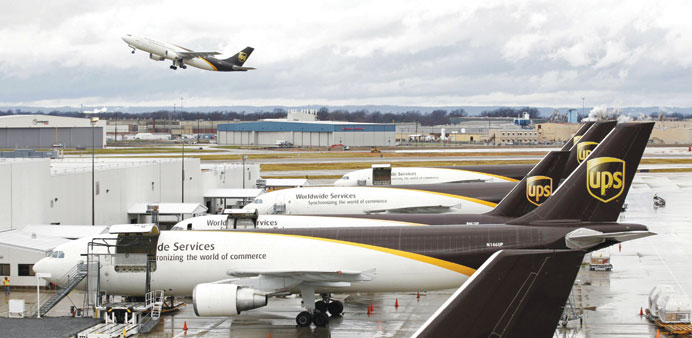UPS aircrafts are loaded with containers full of packages at the UPS Worldport All Points International Hub in Louisville, Kentucky in this file photo taken on December 20, 2012. Big air-cargo shippers such as UPS and FedEx have been forced over the past year and a half to park dozens of jets in the desert as clients avoid pricier overnight services for shipping their laptops, high-end apparel and machine parts, or even opt to send them by sea.
By Doug Cameron/Dow Jones
United Parcel Service Inc issued a profit warning on Friday as customers continue to trade down to slower and cheaper shipping options. While the trend is clear, less so is whether it will reverse were the global economy to pick up.
Big air-cargo shippers such as UPS and FedEx Corp have been forced over the past year and a half to park dozens of jets in the desert as clients avoid pricier overnight services for shipping their laptops, high-end apparel and machine parts, or even opt to send them by sea.
FedEx chief executive Fred Smith has gone as far as to say that the industry faces a “secular” change in behaviour as high oil prices push up the cost of air cargo, a view that increasingly has been embraced by analysts. It also fuelled speculation last week that FedEx could be targeted by activist investors, agitating for an accelerated paring of its global network and for more cash going to shareholders rather than into pricey, long-range cargo jets.
However, the head of one of the world’s largest supply-chain managers is reserving judgment, saying the move away from speedy air-freight services by retailers and manufacturers could reverse as interest rates rise and the economy improves.
“Some people talk about this being a permanent, secular shift--I’m not convinced,” said Marvin Schlanger, chief executive of Netherlands-based Ceva Logistics, which organises shipping services for many multinationals and is both a customer and competitor of UPS and FedEx.
Schlanger said low interest rates have left shipping customers less concerned about the cost of extra inventory they have to carry in opting for sea over air transport, and many have plenty of spare capacity to boost production if demand suddenly improves.
“With low interest rates they can afford to have more goods on the water...and they also have flex in their supply chain and manufacturing operation,” he said.
Some analysts say the shift away from the speediest delivery options may be prolonged by the inability of supply-chain managers to gain approval from top management for a return to costlier delivery methods, in part because transportation costs are seen as a relatively easy way to trim expenses.
“The trade-downs are real, and they’re not likely to go away soon,” said David Vernon, who formerly worked at Deutsche Post’s DHL shipping unit and now covers the logistics sector for Sanford C Bernstein.
Schlanger, who added the CEO post to his role as Ceva’s chairman last October, acknowledges that convincing CEOs and CFOs to look beyond cost and focus more on service and reliability is a tough nut to crack.
However, he already sees signs of transportation managers taking creative steps to avoid lost sales, such as using last-minute charter services to send small consignments by air using the fastest-and priciest-services offered by UPS and its rivals.
“What we’re finding surprising is that our charter business is getting a lot of attention,” he said. “When people get pressed, they’re going to want to have their goods. Nobody wants to give up the sale.”
In cutting its full-year earnings outlook, UPS on Friday cited an “increasing customer preference for lower-yielding shipping solutions,” as well a slowing US industrial economy and overcapacity in the global air-cargo market. The Atlanta-based company now expects adjusted earnings of $4.65 to $4.85 a share, down from its previous view of $4.80 to $5.06. The company pegged second-quarter earnings at $1.13 a share; analysts were expecting $1.20. “We expect the second-quarter market trends to persist, and UPS is adapting to meet these conditions,” said UPS finance chief Kurt Kuehn.

